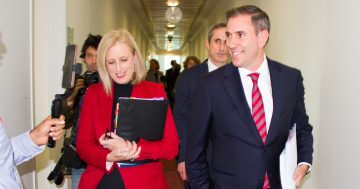
In the old days when knights were bold and ladies fair, and a gay time meant partying, Budgets were always all about increases in petrol, booze and smokes. Every time, the same old bunch of wowsers thought it was good stuff whilst the rest of us just got on with it, resigned to the inevitable.
It is the same today but booze, petrol and smokes are not highlighted so much. And definitely not in the ACT Budget. Perhaps it is because increases to these staples was always a federal issue cos they were tax increases.
These days at the federal level, it’s all about spending more on killing machines and sticking it to the low economic group; all about letting the big corporates off with a $50 billion tax cut but increasing the Medicare levy for everyone. Well, Mr Prime Hamster, the richies can afford top cover in the private sector or just pay for the big hospital bills out of petty cash. But the families on $50,000 or less depend on Medicare and the increase will mean something has to go. And I don’t mean they have to give up Foxtel or eating out. I mean school excursions; replacement clothes for the kids, putting $20 of petrol in the car because they can’t fill it up; I mean hanging on to the gas guzzling old monster instead of a new environmentally friendly car because they can’t afford the repayments. I mean renting longer because they can’t save for a house.
Sleep well, Mr Prime Hamster. You live in two Government owned houses rent free and have squillions. You are just the richest public housing tenant in the country. Don’t you worry your pretty little head about the serfs and slaves. They will look after themselves.
The same can be said about the ACT Budget in a way. The predicable items are more spending on roads, shops, schools and heaps on the hospital. The money comes from slugging rates and services whilst pretending to offset them all by reducing stamp duties. The flaw in this is that there are many in the community who don’t pay stamp duty cos they bought their homes ages ago and the other stamp duties are still there. In other words, the home buyers are getting a one-off benefit only to pay it back exponentially over the ensuing years though increases in rates and services.
I noted that in the past week the same old reprobates complained about everything in the Budget including the disruption that road expenditure delivered. But most of the people I know and talk to haven’t raised any issue with me.
Well, my suburb has been a construction zone for months lately and surrounded by massive improvements in the arterial road system and more to come. I remember it being quicker to go by bike from Woden to Tuggers but not anymore. The road stuff is great. And the footpaths are gradually getting fixed. I know cos I notice these things and I am not fixated on the 100 metres on either side of my house.
But I make this observation. Most people look at the Budget and say: well, I can’t do anything about that so I’ll just suck it up and get on with life. They don’t moan and groan; they don’t gnash their teeth, they don’t chew their fingernails down to the elbow worrying about how they’re going to get by. They just do.
I will though, make another observation. Have you noticed that most everyday expenses have gone up in price for the past couple of years? And not just marginally either. Heaps in some cases.
I was once told that the major expense business has is salaries and wages. In some cases, it was as high as 85%. Well, salaries and wages haven’t gone up nearly as high as the prices have. So what’s the go Anna? Is it time for a new Prices and Wages Accord? We seem to have no blanket on price increase but there are pressures to keep salaries and wages down.
Heck… the public service hasn’t had a decent rise in years and the CSS superannuants get about 1% or less a year increase. I pity those self-funded pensioners on fixed pensions. The value of their savings and pensions deteriorates as the spending power of the dollar decreases.
Anyway, I though both Budgets were just ho hum and not unpredictable enough for me to lose sleep. I thought the federal Budget was a safety first one for the Prime Hamster and environmentally unfriendly with a (L)iberal dose of war mongering and scare tactics about those horrible asylum seeking terrorists. And I thought the ACT one was as good as one could expect. We were all told what was in the ACT Budget through leaks to the media and apart from the usual commentariat belly aching, no one seemed to notice it was done.
People seemed more interested in the horror stories from England and Europe and I don’t mean the British Elections (although for some I guess it was a horror story, especially that knight-errant, Sir Lynton). They were more interested in the unfolding of the comedic events dogging Pres Trump. Someone really should take the shovel off that guy.
Even though Tuggeranong is the ACT Cinderella, we have had a better time dealt out in this Budget from Andrew Barr than in previous years so hey, life’s not that bad.
So come on, you guys, let’s be having you…





















